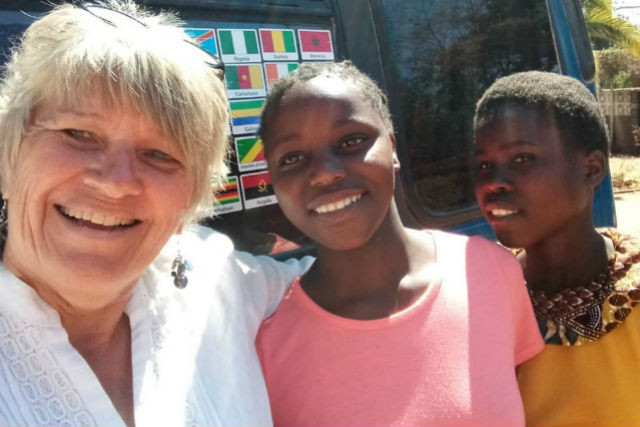Dot Bekker dramatically downsized her life into 18 plastic crates and set out on a one-way journey at the end of 2018 with Bluebelle, her trusty Ford Transit 94-2000 van.
“I think it would be hard to define the best moment but I think I got the most joy out of every day events where people were just happy to see me and smiled and I would exchange words,” Bekker recalled, adding: “If I drove in Luxembourg waving at people, they would commit me to an asylum, but in Africa people wave back and smile!”
Avid followers of Bekker’s posts on the Facebook page “Going Home to Africa” will know it was a challenging experience. “No matter how much information you got, you never knew if it was the right information or not.” Between the poor quality of the roads, breaking down, getting stuck in sand and customs bureaucracy, Bekker and Bluebelle had their fair share of problems. Facing them with a “sense of humour, and a smile and respect”, helped no end.

Bekker joked that African Roadside Assistance remains faster, cheaper and more effective than any in Europe. Photo shows people helping to push Bluebelle in January 2019. Photo: Dot Bekker
Posting updates about her struggles on Facebook also helped--after every message she would always be greeted with words of encouragement and sometimes even solutions from locals or other “overlanders”, a term for people who drive through Africa.
At no point did she have second thoughts. “The thing about being stuck in the middle of Africa is that the second thought is ‘how the hell do I get out of this?’ Because turning back just isn’t an option,” Bekker laughed.
Life begins at 60
The entrepreneur’s journey was prompted by a change in personal circumstances and the knowledge that she was approaching a landmark age. Bekker spent her 60th birthday in Morocco, the first country on her African odyssey and one which she remembers fondly.
Bekker is pictured in this June 2019 photo when she was struggling with bureaucracy in Angola. Photo: Dot Bekker
Speaking to Delano on Wednesday from a donkey sanctuary in Bulawayo, Zimbabwe, where she continues to live in Bluebelle, Bekker explained she is still far from her goal. Her long list of projects includes expanding a scholarship fund for high-achieving vulnerable or disadvantaged girls and funding it through local handicraft sales, providing business coaching to people in townships and writing a book.
Most of her ideas focus on supporting women to be the architects of change and are funded through the non-profit Kusasa. Citing the improvements in Ethiopia, which last year elected its first female president in Sahle-Work Zewde, Bekker said: “Women are less corruptible. We need to be everywhere men are.”
Bekker doesn’t expect the rest of her journey to get any easier. She arrived in Zimbabwe to find a country in crisis: mass food shortages, drought, ballooning prices and a decaying infrastructure. Low water levels in the Zambezi river have led to frequent power cuts or load sharing as the managed cuts are called. But Bekker says she has never felt so full of joy. And, if the journey has taught her anything, it is to take each day and challenge at a time.

